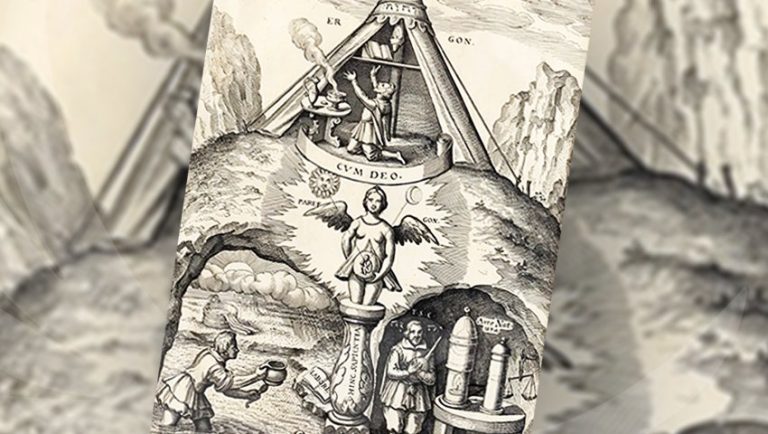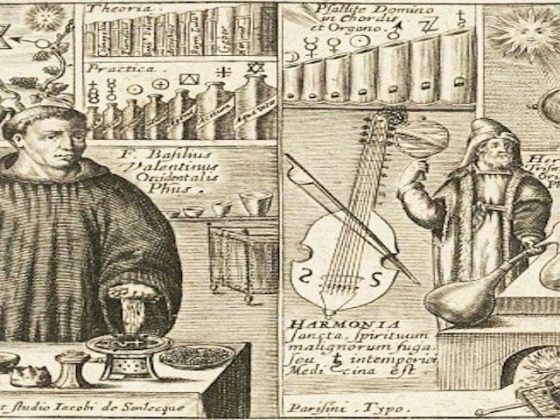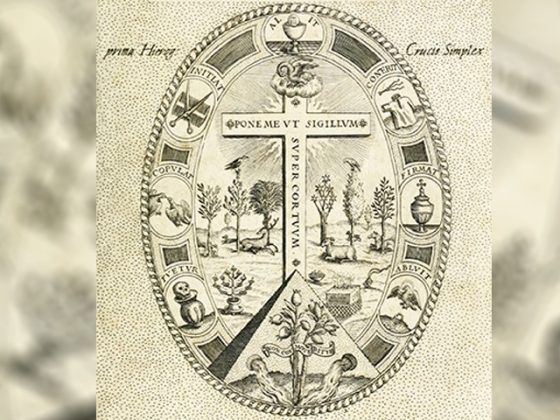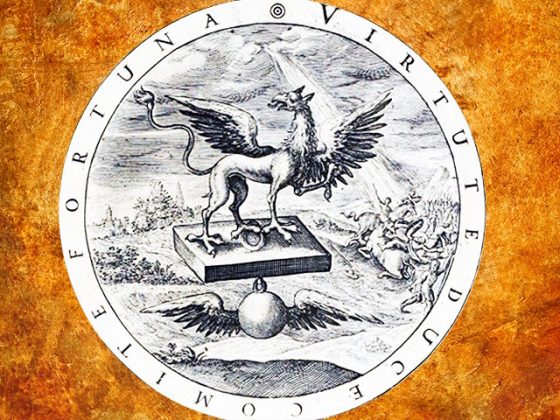Dearly beloved friends:
I am pleased to send you this engraving entitled…
…SPECULUM SOPHICUM RHODOSTAUROTICUM
─‘Mirror of Rosicrucian wisdom’─
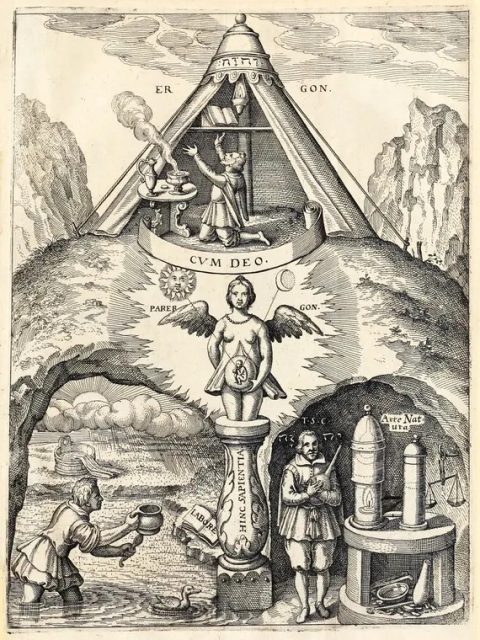
The book was signed with the name Theophilus Schweighardt Constanties, which is believed to have been the pseudonym of Daniel Möglin (1596-1635), a German alchemist, physician and astronomer. The engraving was made by Matthaus Merian (1593-1650), a Swiss-German engraver.
Description:
Three panels are grouped around the central female figure.
In the lower half, on the left, we see a young man in a river with a bowl and spoon in his hands. Such a young person is anyone who, knowing the ars transmutatorium, does not lose his creative energies.
On the shore we see a canvas representing the inner garments impregnated by the sacred rays of alchemical dew, and at the same time the rays of the sun that penetrate through a cloud and flood the earth. The scene is accompanied by an open book with the inscription LABORE ─'by means of the work'─.
The open book always symbolized in alchemical terms the MERCURY undergoing its transmutations.
The young man extends the objects he has in his hands toward a character who can be identified as an alchemist, surrounded by tools. Arte Natura, the initials T.S.C and the Hebrew letters that encompass the word Iod He Vau He are written on the walls of the cave. The alchemist cited here is the author/artist of the engraving himself, and that is why his initials appear in the engraving itself ─T.S.C.─. Without a doubt, transmutation is AN ART linked to the sacraments of the SUPREME BEING ─IOD HE VAU HE─.
It is noteworthy that this Adept or Master alchemist embraces with his two hands an alchemical cylinder, a symbol of the feminine womb.
Among the objects that the alchemist has near him we see a scale. Such a scale refers to the equal weights of the elements of the work: such a quantity of Sulfur for such a quantity of Mercury. These weights are handled by the Divine Mother Kundalini.
On a rock formation, at the top of which a conical tent has been erected, there is a third figure kneeling before a smoking bowl with his hands extended toward the sky. The words ERGON, meaning ‘labor', and CVM DEO, ‘with God', are placed near the tent.
ERGON derives from the Greek ἔργον, which means ‘work, labor'. Obviously every true alchemist turns the coitus into a prayer, which is why he is seen kneeling while doing his ablutions during the work with the magisterium of fire. Above the alchemist, at the top, we again see the words that describe the blessed JEHOVAH: IOD HE VAU HE.
In the centre of the image is a winged female figure, the Virgin carrying the child in her womb. Her feet are one with a column that has the inscription HINC SAPIENTIA ─‘henceforth, wisdom’─. PARERGON, from the Greek, which means ‘that which is next to the work'. This in Rosicrucian dialectics means respectively the spiritual work and the material work. No doubt this winged female figure is our blessed RAM-IO, which is represented here by a “hermetic” vessel that receives the influences of the Sun and the Moon. The Sun is Sulfur and the Moon is the Mercury of the sages. With both substances, the Golden Child of Alchemy is generated ─the intimate Chrestos, the same one that we see in her womb─.
In the book Liber sapientiae of the Old Testament it speaks about the wisdom and the spirit that it harbors within.
It is important to note that the words Cum Deo and Hinc Sapientia are well indicated as meaning ‘with God' and ‘henceforth, wisdom', or ‘from this moment on wisdom,' as if to emphasize what happens after an alchemical work that leads to the ascent of fire along the spine, i.e., an increase in wisdom.
Labore means only ‘by means of work'.
Arte Natura indicates ‘nature through art'.
It should be noted that the name Theophilus, in Greek, means ‘one who loves God'. Schweighardt, in German, is broken down like this: schweig has a relationship with ‘silence', and hardt, ‘difficult' but also ‘strong'; it could be translated as ‘strong in silence'. And Constantiens, although not a word in any language, clearly has connotations with constancy. It is as if these letters were a synthesis of the virtues necessary to be able to receive the BEING indicated by the TETRAGRAMMATON immediately below.
Wisdom 7
1 I too am a mortal, the same as all the rest, and a descendant of the first one formed of earth. And in my mother’s womb I was molded into flesh.
2 In a ten-month period —body and blood, from the seed of a man, and the pleasure that accompanies marriage.
3 And I too, when born, inhaled the common air, and fell upon the kindred earth; wailing, I uttered that first sound common to all.
4 In swaddling clothes and with constant care I was nurtured.
5 For no king has any different origin or birth.
6 One is the entry into life for all, and in one same way they leave it.
Appreciation for wisdom
7 Therefore I prayed to God, and prudence was given me; I pleaded and the spirit of Wisdom came to me.
8 I preferred her to scepter and throne, and deemed riches nothing in comparison with her,
9 Nor did I liken any priceless gem to her; because all gold, in view of her, is a bit of sand, and before her, silver is to be accounted mire.
10 Beyond health and beauty I loved her, and I chose to have her rather than the light, because her radiance never ceases.
11 Yet all good things together came to me with her, and countless riches at her hands.
12 I rejoiced in them all, because Wisdom is their leader, though I had not known that she is their mother.
13 Sincerely I learned about her, and ungrudgingly do I share— her riches I do not hide away.
14 For she is an unfailing treasure; those who gain this treasure win the friendship of God, being commended by the gifts that come from her discipline.
15 Now God grant I speak suitably and value these endowments at their worth: For he is the guide of Wisdom and the director of the wise.
16 For both we and our words are in his hand, as well as all prudence and knowledge of crafts.
17 For he gave me sound knowledge of what exists, that I might know the structure of the Universe and the force of its elements,
18 The beginning and the end and the midpoint of times, the changes in the sun’s course and the variations of the seasons,
19 Cycles of years, positions of stars,
20 natures of living things, tempers of beasts, powers of the winds and thoughts of human beings, uses of plants and virtues of roots.
21 Whatever is hidden or plain I learned, for Wisdom, the artisan of all, taught me.
In Praise of wisdom
22 For in her is a spirit intelligent, holy, unique, manifold, subtle, agile, clear, unstained, certain, never harmful, loving the good, keen,
23 unhampered, beneficent, kindly, firm, secure, tranquil, all-powerful, all-seeing, and pervading all spirits, though they be intelligent, pure and very subtle.
24 For Wisdom is mobile beyond all motion, and she penetrates and pervades all things by reason of her purity.
25 For she is a breath of the might of God and a pure emanation of the glory of the Almighty; therefore nothing defiled can enter into her.
26 For she is the reflection of eternal light, the spotless mirror of the power of God, the image of his goodness.
27 Although she is one, she can do all things, and she renews everything while herself perduring; passing into holy souls from age to age, she produces friends of God and prophets.
28 For God loves nothing so much as the one who dwells with Wisdom.
29 For she is fairer than the sun and surpasses every constellation of the stars. Compared to light, she is found more radiant;
30 though night supplants light, wickedness does not prevail over Wisdom.
We add a statement by the alchemist Heinrich Khunrath that appears in his book Anfiteatro sapientiae aeternae solius verae ─ ‘Amphitheater of eternal wisdom, the only true one'. We have found it in a commentary related to that engraving. It seems like a testimony given by the alchemist himself:
“As soon as you realize that this work is done, you will experience an inner shock and ─ah!─ you will cry with joy! For you will understand and be able to be completely sure that original sin has been removed and has been driven away from you by the fire of divine love in the act of a new birth of body, mind and soul by the hand of God.”
I add a few quotations for reflection:
“The advantage of knowledge lies in being able to choose the line of the greatest advantage instead of following the direction of least effort.”
Bernard Shaw
“To think and to act, to act and to think, is the sum of all wisdom.”
Goethe
“Being wise is a fruit of one’s own harvest.”
Juan de Torres
“He who knows his own ignorance knows much.”
Confucius
“There is a great distance between knowing a lot and knowing everything.”
Bernardo Sartolo
HIC ET NUNC.
─'Here and now'─.
KWEN KHAN KHU


